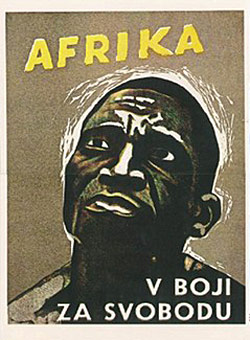
Unit 6: Modern World History
Lesson B: 20th Century Global Politics - Decolonization
Lesson Overview

Decolonization Support Poster from Czechoslovakia [1]
Modern colonization began during the mid 15th century when European countries used new technologies to gain new resources and land. It was not until the mid-20th century that many countries in the world broke free of colonization and became independent. These new countries faced challenges as they determined who would rule, tried to build their economies, and decided what rights citizens would have. The legacy of colonization is that formerly colonized countries struggled to try and catch up to their former imperial rulers. Inequalities that exist today between countries often reflect the colonial past. The focus of this lesson is on the development of those newly independent countries in Asia and Africa.
Key Questions
- Why do changes in economic and/or political systems cause cultural change?
- Why are there disparities between how countries developed after achieving their independence?
- How did the Cold War influence decolonization?
- Why do people around the world continue to struggle in democratic movements? And, is democracy universal?
Student Outcomes
- Analyze how nationalism and nationalistic leaders led the demand for colonial independence in nations including Gandhi in India, Ho Chi Minh in Vietnam, Kwame Nkrumah in Ghana, and Kenyatta in Kenya.
- Explain how democracy flourished in some former colonies, such as India, but did not flourish in former colonies such as Ghana.
- Compare the development of systems of governments in the Middle East, including Egypt, Israel, Iran, Saudi Arabia, Ghana, India, and Vietnam.
- Explain how the legacy of colonization was under-development in comparison with former imperial nations.
- Identify issues and problems in the past. (Historical Thinking Skill)
- Marshal evidence of antecedent circumstances. (Historical Thinking Skill)
- Identify relevant historical antecedents. (Historical Thinking Skill)
- Evaluate the implementation of a decision. (Historical Thinking Skill)
Key Terms
- Association of Southeast Asian Nations (ASEAN)
- capitalism
- colonization
- communism
- democracy
- developed country
- Gross Domestic Product (GDP)
- Holocaust
- independence
- nationalism
- United Nations (UN)
- Zionism
Student Resources
- Decolonization Case Study Graphic Organizer (doc)
- Success and Failure of Decolonization Graphic Organizer (doc)
- Decolonization and Development: Ghana Research Guide (doc)
- Decolonization and Development: India Research Guide (doc)
- Decolonization and Development: Egypt Research Guide (doc)
- Decolonization and Development: Israel Research Guide (doc)
- Writing the Historical Interpretation (doc)
Chart of Activities
| Activities to Complete | Estimated Time |
|---|---|
| Key Terms | 10 minutes |
| Activator: The World 1900s - Present | 10 minutes |
| Opening: Nationalism, Individuals and Change | 5 minutes |
| Activity 1: Decolonization | 10 minutes |
| Activity 2: Locating Vietnam | 10 minutes |
| Activity 3: Colonial History | 15 minutes |
| Activity 4: End of Colonialism | 15 minutes |
| Activity 5: Struggling with Independence | 15 minutes |
| Activity 6: Times of Change | 15 minutes |
| Activity 7: Comparing Vietnam and the United States | 20 minutes |
| Activity 8: Jigsaw Case Studies - Decolonization and Independence | 60-120 minutes; determined by teacher |
| Review and Assessment | 60 minutes |
| Lesson Summary | 5 minutes |
Lesson Completion Time
The total estimated time to complete this lesson is 250-310 minutes.
Page Notes:
[1] Source: This image from http://en.wikipedia.org/wiki/File:Africa_cs_poster.jpg is in the public domain.

